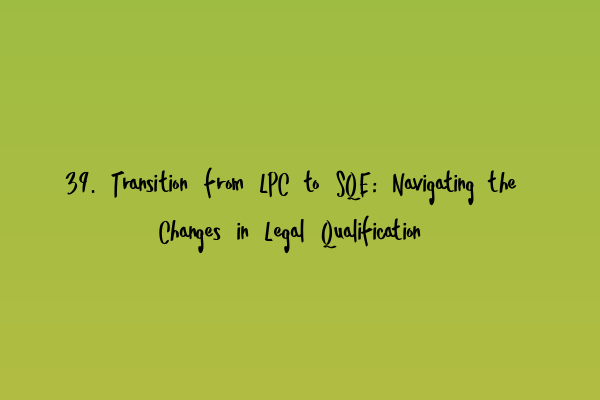Transition from LPC to SQE: Navigating the Changes in Legal Qualification
As the legal profession evolves, so too do the pathways to qualification. In the past, aspiring solicitors in England and Wales would follow a traditional route through the Legal Practice Course (LPC) to achieve their goal. However, a new qualification known as the Solicitors Qualifying Examination (SQE) is set to replace the LPC, bringing about significant changes to the qualification process.
In this blog post, we will discuss the transition from the LPC to the SQE, highlighting the key differences and offering guidance on how to navigate these changes successfully.
The Transition: From LPC to SQE
The SQE represents a significant departure from the existing LPC route. Instead of completing a one or two-year LPC course, aspiring solicitors will now need to pass a two-part examination. The SQE1 focuses on assessing functioning legal knowledge, while the SQE2 tests practical legal skills through simulated client-based tasks.
This transition has raised concerns among many LPC graduates, who worry about the impact it will have on their career prospects. However, with the right understanding and preparation, you can effectively navigate the changes and ensure a smooth transition to the SQE.
Key Differences Between LPC and SQE
The first step towards a successful transition is understanding the key differences between the LPC and the SQE. Here are some of the notable changes:
- Structure: Unlike the LPC, which consists of a course with various modules, the SQE is an examination-based assessment.
- Focus Areas: The SQE places a greater emphasis on practical skills and legal knowledge application, as opposed to theoretical understanding.
- Assessment Methods: While the LPC primarily evaluates students through coursework and exams, the SQE assesses candidates purely through examinations.
- Cost: The cost of the LPC varies depending on the institution, whereas the SQE is expected to have a standardized fee structure.
Understanding these key differences will enable you to approach the transition process with clarity and confidence.
Preparing for the SQE
With the changes in the qualification process, it is important to adapt your study plan and preparation strategies accordingly. Here are some tips to help you prepare for the SQE:
- Utilize SQE Sample Papers: Practice is essential for success in any examination. To familiarize yourself with the format and structure of the SQE, it is highly recommended to use SQE sample papers. These papers provide an opportunity to test your knowledge and identify areas for improvement. Check out SQE Sample Papers: Practice for Exam Success for more information.
- Master Key Concepts: Understanding the focus areas of the SQE is crucial for effective preparation. Focus on mastering key legal concepts and practical skills that are likely to be assessed in the examination. For detailed information on the focus areas of SQE1 and SQE2, refer to Focus Areas in SQE1 and SQE2: Mastering Key Concepts.
- Adapt Your Strategy Based on Mock Performance: Mock examinations are invaluable tools for identifying strengths and weaknesses. Analyzing your performance in SQE mock tests can help you refine your study plan and focus on areas that require improvement. Read Adjusting Your SQE Strategy Based on Mock Performance to learn more about the importance of mock exams.
- Take Advantage of SQE Mock Debrief Sessions: Mock debrief sessions offer critical insights and guidance for improvement. Participating in these sessions can help you understand the areas where you need to enhance your knowledge and skills. Find out more about the significance of SQE mock debrief sessions in SQE Mock Debrief Sessions: Critical Steps for Improvement.
- Elevate Your Scores with SQE Sample Papers: To achieve high scores in the SQE, consistent practice is key. Working through a variety of SQE sample papers can help you refine your exam technique and enhance your performance. Discover the benefits of practicing with SQE sample papers here.
By incorporating these strategies into your study routine, you will be well-prepared to tackle the challenges of the SQE and emerge successful.
Conclusion
The transition from the LPC to the SQE represents a significant milestone in the legal qualification process. While the changes may seem daunting at first, with the right mindset and preparation, you can navigate the transition smoothly and position yourself for success.
Remember to familiarize yourself with the key differences between the LPC and the SQE, adapt your study plan to the new requirements, and make use of resources such as SQE sample papers and mock debrief sessions. By following these steps, you can approach the SQE with confidence, knowing that you have prepared yourself thoroughly.
For more information on how to navigate the transition, access helpful resources, and practice with SQE sample papers, visit our website.
